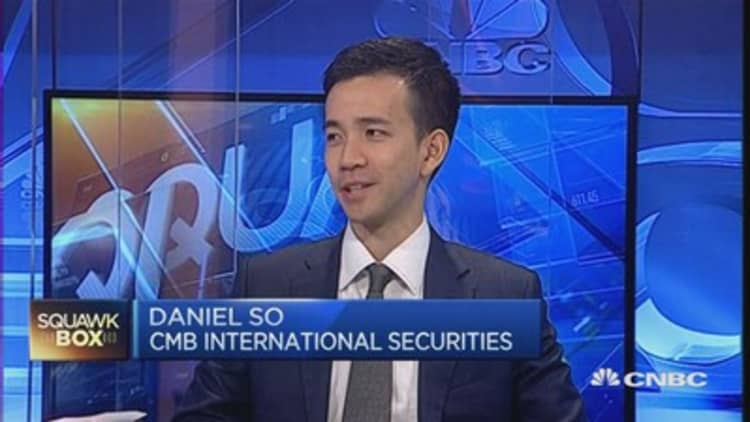Asian equities advanced on Tuesday, as the morale of investors got a boost from the overnight rally on Wall Street.
However, markets in China fell short of broader advances across the region amid jitters surrounding a crackdown on illegal futures trading and ongoing anti-corruption investigations into companies such as Dongfeng Motor Group.
According to state-owned Xinhua news agency, the manager of Zexi Investment, Xu Xiang, was detained by police on Sunday. Xu, one of China's largest private money managers, is being investigated on charges of suspected insider trading.
Meanwhile, the President of Agricultural Bank of China, Zhang Yun, was taken away to assist authorities with an investigation, the Financial Times reported Monday, citing local media reports from Sina Finance and QQ Finance.
The latest developments come as Beijing intensified a probe on alleged market manipulation following a dramatic meltdown in its equity markets earlier in June and July.
In other news, the Communist Party's anti-graft regulator said Monday it is investigating Zhu Fushou, the president of Dongfeng Motor Group —China's second-biggest automaker by sales— for "suspected severe violation of discipline". Discipline violations generally refer to corruption.
Major U.S. averages each climbed nearly 1 percent or more overnight, helped by gains in energy and healthcare counters.
The Nasdaq Composite led advances with a rise of 1.5 percent, while the finished at its highest level in more than 15 years. the Dow Jones Industrial Average closed up 0.9 percent. The S&P 500 gained more than 1 percent to top 2,100 points. The last time the index crossed 2,100 in intraday trade was August 18, and its last close above that level was on August 17.
Mainland stocks choppy
China's key index closed down 0.2 percent after turning negative in the afternoon trading session. Among other indexes, the blue-chip CSI300 index erased earlier gains to fall 0.3 percent and the smaller Shenzhen Composite nudged down marginally.
However, Hong Kong's Hang Seng index outpaced its mainland peers to climb 1.1 percent.
Shares of companies linked to Beijing's widening probe into market manipulation and suspected corruption were in focus; Dongfeng Motor bounced up 4.2 percent in Hong Kong, seemingly unaffected by the news, but its Shanghai-listed subsidiary plunged 4.5 percent.
Agricultural Bank of China, one of the country's largest state-owned lenders, lost 1 percent in Shanghai, while its Hong Kong-listed stock advanced 0.7 percent.
China Seven Star Holdings, one of the companies that were linked to hedge fund Zexi Investments, tumbled 28 percent.
Meanwhile, retail plays in Hong Kong were mixed ahead of the September retail sales due at 4.30 am local time. Li Ning and Chow Tai Fook eased more than 1 percent each, but Sa Sa International and Giordano advanced 0.4 and 1.2 percent respectively.
Read MoreChanging its baby policy may not be enough for China
Taiex leaps 1.1%
Taiwan's weighted index settled at a near one-week high, with the help of gains in U.S. tech counters.
Large-cap Taiwan Semiconductor Manufacturing Co (TSMC) leaped 1.5 percent, while Apple suppliers such as Catcher Technology and Hon Hai Precision Industry gained 3.6 and 0.5 percent respectively.

ASX jumps 1.4%
Australia's index rose after the Reserve Bank of Australia (RBA) left interest rates unchanged at its monthly meeting, in line with expectations.
The Australian dollar steadied at $0.7205 against the U.S. dollar by late-day trading, recovering from a brief dip to $0.7151 following the central bank's announcement.
Westpac rallied 2.3 percent, recouping almost all of Monday's steep fall. Australia and New Zealand Bank, Commonwealth Bank of Australia and National Australia Bank jumped more than 1 percent each.
In the resources space, market bellwether BHP Billiton advanced 1 percent, while oil and gas producer Santos extended gains by surging 4.4 percent, a day after announcing the sale of its Stag oil field to Malaysia's Sona Petroleum.
Gold-related counters turned positive even as prices of the precious metal lingered near four-week lows in Asian trade; Evolution Mining and Alacer Gold shot up 3.4 and 7.1 percent respectively.

Kospi gains 0.7%
South Korea's Kospi index headed north on the back of sharp jumps in specific stocks such as heavyweight component Posco which surged 4.7 percent.
Hyundai Motor and Kia Motors climbed 2.5 and 4.7 percent respectively, given a lift by industry data released on Monday which showed October auto sales in South Korea rose 8.7 percent from a year ago period. Ssangyong Motor gained 0.7 percent.
Daewoo Shipbuilding & Marine Engineering charged up nearly 8 percent despite denying market speculation that its creditors were trying to sell the shipbuilder to SK Group.
However, the bourse's heaviest weighted stock Samsung Electronics declined 2.2 percent.
On the domestic data front, inflation in Asia's fourth-biggest economy unexpectedly rose at the fastest pace in almost a year, according to official data released prior to Tuesday's market open. The consumer price index (CPI) increased 0.9 percent in October from a year earlier, beating expectations for a 0.8 percent gain and compared with a 0.6 percent advance in September.
Markets in Japan are closed for the Culture Day holiday.

